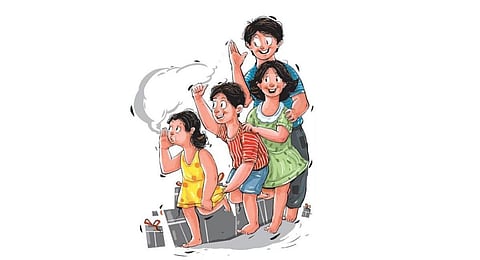

BENGALURU: There is a fond tingle in the term ’90s kid. Summer holidays for an Indian ’90s kid were a pilgrimage, undertaken with friends, siblings, cousins and neighbours, blessed to be free from the saga of assignments, projects, homework, and punishments at school.
The 60 days that unlocked after the long-drawn academic year felt like ‘freedom at last’. Those two months were packed with activities, whose history albeit unknown, were passed down over generations. There were simple games, only requiring paper and pencils, sometimes just hands, or spoken words, and yet we saw purpose in playing them.
It’s the summer of 1999, and the first morning after the close of school for the year! Hordes of cousins, along with uncles and aunties, just landed the previous night, and the cacophony of their loud storytelling has filled my otherwise quiet house with an excited fervour, which is screaming even louder, ‘It’s Summer Holidays! ‘ Hot summers in Bengaluru are chequered with unexpected spells of rain, which feels more sublime in the warmth of home, playing the games that exemplified those holidays.
In the days before screen time, reading books was an essential boredom-buster. We read at school, on the bus, and before bed, solidifying our vocabulary and GK. Hence, ‘Name Place Animal Thing’ was the game to kick off the gala. One of us began a silent count of the alphabet, before being stopped midway. The players, armed with a pencil and a sheet of paper (with rows and columns), would jot down names of a person, place, animal and object, starting with the letter on which the counting stopped. Points were accordingly given. The game would continue clockwise and end when the sheets were fully used, and the points were calculated to declare the winner. I often won this, much to my competitors’ dismay.
The days would steadily pass, with each dedicated to a game or two, accompanied by drinks, chips, samosas, and other treats. “Let’s play Dots,” someone said. A sheet of paper, with dots drawn on it in a pattern of rows and columns, and pencils were the only things needed. The object of the game? To trace lines between two dots on your turn, such that you complete boxes between four dots, and score points. The person with the most boxes won. Much like ‘Tic Tac Toe’, this game requires little time to play.
Cricket fever took over summers. But when the sun became unbearable, our mothers began a tireless pursuit of pulling us back home from the street. We would congregate in one house, taking our cricket there. Only this time, it was ‘Book Cricket’. This indoor game, which was every ’90s schoolboy’s class-time secret, required no more than paper, pencils, and any school textbook or dice. Two players would play a team each, with page numbers in the textbook (as appearing when flipped) or a dice roll declaring scores and wickets. This would be registered on paper like a cricket scoreboard. One with the most runs won.
Thirty days into the holidays, we all sit in a circle, and plan our next frolic – ‘Chitti Kalla Police’. Little chits with King, Queen, Policeman, and Thief written on them and folded, are used in play. The players discretely play the roles of the four characters, after picking up and unwrapping the chits. The object is for the policeman to guess the thief correctly. Next up is ‘Chinese Whispers’, followed by ‘Current Pass’, ‘Wink Murder’, ‘Pick-up Sticks’, ‘Blind Man’s Buff’, ‘Dark Room’, and ‘Pillow Fight’.
The games were many, with one more challenging than the other, however, each oxymoronically simple in its design. Most households in the ’90s Bengaluru were accentuated with kids spending their holidays playing such games with gusto. Sometimes, even the adults joined, either to cheer for the young ones, or to compete with them. They pushed for ‘Antakshari’, ‘Word Building’, and ‘Dumb Charades’. It was complete family fun.
The indoor games, those holidays, asked for little to no spending, yet were ingenious, innovative and intelligent. They brought people to spend time together, and indulge in some healthy competition. They taught children the importance of winning and losing, in good spirit, while inculcating in them lessons in sharing and teamwork. The days of the present feel shorter, as if we are losing time, with too few memories to hold onto. It’s important that we revisit those good old days to rekindle those bonds in the current era – one overrun by devices. Those games to beat the summer heat over 20 years ago, if not
anything, won us everlasting relationships.
(The writers’ views are their own)